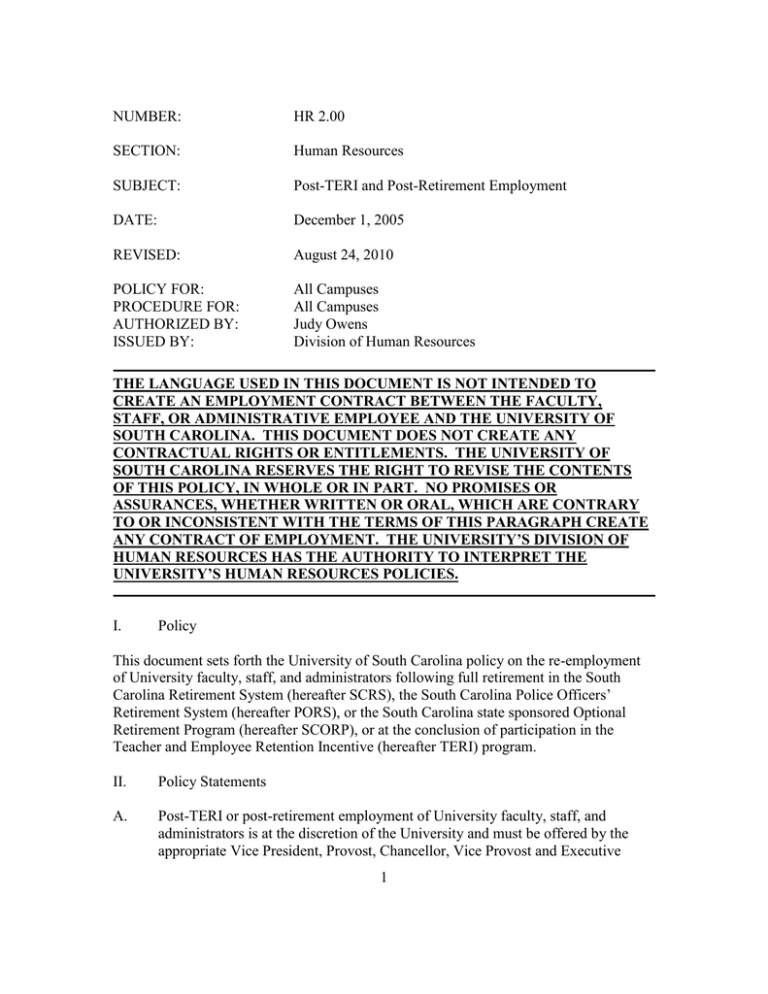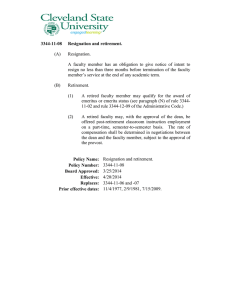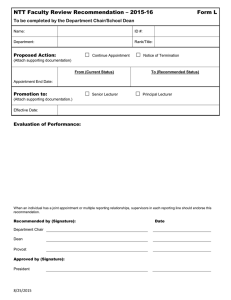NUMBER: HR 2.00 SECTION:
advertisement

NUMBER: HR 2.00 SECTION: Human Resources SUBJECT: Post-TERI and Post-Retirement Employment DATE: December 1, 2005 REVISED: August 24, 2010 POLICY FOR: PROCEDURE FOR: AUTHORIZED BY: ISSUED BY: All Campuses All Campuses Judy Owens Division of Human Resources THE LANGUAGE USED IN THIS DOCUMENT IS NOT INTENDED TO CREATE AN EMPLOYMENT CONTRACT BETWEEN THE FACULTY, STAFF, OR ADMINISTRATIVE EMPLOYEE AND THE UNIVERSITY OF SOUTH CAROLINA. THIS DOCUMENT DOES NOT CREATE ANY CONTRACTUAL RIGHTS OR ENTITLEMENTS. THE UNIVERSITY OF SOUTH CAROLINA RESERVES THE RIGHT TO REVISE THE CONTENTS OF THIS POLICY, IN WHOLE OR IN PART. NO PROMISES OR ASSURANCES, WHETHER WRITTEN OR ORAL, WHICH ARE CONTRARY TO OR INCONSISTENT WITH THE TERMS OF THIS PARAGRAPH CREATE ANY CONTRACT OF EMPLOYMENT. THE UNIVERSITY’S DIVISION OF HUMAN RESOURCES HAS THE AUTHORITY TO INTERPRET THE UNIVERSITY’S HUMAN RESOURCES POLICIES. I. Policy This document sets forth the University of South Carolina policy on the re-employment of University faculty, staff, and administrators following full retirement in the South Carolina Retirement System (hereafter SCRS), the South Carolina Police Officers’ Retirement System (hereafter PORS), or the South Carolina state sponsored Optional Retirement Program (hereafter SCORP), or at the conclusion of participation in the Teacher and Employee Retention Incentive (hereafter TERI) program. II. Policy Statements A. Post-TERI or post-retirement employment of University faculty, staff, and administrators is at the discretion of the University and must be offered by the appropriate Vice President, Provost, Chancellor, Vice Provost and Executive 1 Dean or Dean. Employment must be offered by the President or the Chairman of the Board of Trustees for positions that report to that level. B. Post-TERI and other faculty, staff, and administrators retired from the University of South Carolina may be employed for no longer than one year per appointment. Temporary employees do not accrue annual or sick leave or have paid holidays. Subsequent one-year renewals may be offered as noted in Section III. C. of this policy. C. Post-TERI and other faculty, staff and administrators who retired from positions in South Carolina state government and are re-employed in temporary positions are required by state law to contribute to the SCRS, the PORS, or their ORP. Those re-employed in FTE positions as an approved exception to this policy (see Section II. H.) also are required by state law to contribute to the SCRS, the PORS, or their ORP. The University is required to pay its portion as well. D. Employment during each one-year post-TERI or post-retirement appointment is at-will, and may be terminated at any time, with or without cause, at the discretion of the hiring administrator. Post-TERI and other employees described in Section I of this policy do not have faculty or staff grievance rights (as defined by the Faculty Manual or the State Employee Grievance Procedure Act) or tenure status. E. Waiting Periods 1. Retirees from South Carolina State government who did not participate in the TERI program must wait 15 consecutive calendar days before returning to State employment that is covered by the SCRS or an ORP. Failure to wait the 15 consecutive calendar days will result in the suspension of retirement payments while the retiree remains employed by the covered employer. 2. For TERI retirees, time participating in the TERI program counts toward the 15 consecutive calendar day waiting period; however, a post-TERI retiree must be off the University payroll for at least one work day prior to re-employment. 3. Retired members of the PORS must wait 15 consecutive calendar days before returning to employment covered by the PORS. Failure to wait the 15 consecutive calendar days will result in the suspension of retirement payments while the retiree remains employed by the covered employer. F. Salary of Post-TERI/Post-Retirement Employees 1. There are no earnings limitations associated with post-TERI or post-retirement re-employment in a temporary position. 2. G. H. In the event a post-TERI or post-retirement employee is reemployed into a classified FTE position as an approved exception to this policy (see Section II. H.), the South Carolina Office of Human Resources (hereafter State OHR) requires that the salary be approved in advance if it is above the midpoint of the pay band. Former Executive Compensation System employees re-employed in FTE Executive Compensation System positions must have their salaries approved by the full Budget and Control Board if the salary is above the midpoint of the pay range. Advertising Post-TERI/Post-Retirement Positions 1. Post-TERI or post-retirement former faculty, staff, and administrators of the University of South Carolina may be reemployed in the same department from which the employee separated without the department advertising the position, provided that re-employment takes place within one year from the time the employee left the department. 2. Post-TERI or other employees retired from the University of South Carolina may apply for any advertised vacancy for which they are qualified; however, if hired, their appointment is temporary, at-will and may be no longer than one year with the opportunity to be offered subsequent one-year renewals. Policy Exceptions 1. Exceptions to this policy will be rare and only for good cause shown. 2. Exceptions must be approved by the President of the University upon the recommendation of the appropriate Vice President, Provost, Chancellor, Vice Provost and Executive Dean or Dean. III. Procedure A. Approval for Post-TERI/Post-Retirement Employment 1. Faculty a. On the Columbia and USC School of Medicine campuses, the authority to offer post-TERI or post-retirement employment into a faculty position rests with the appropriate dean. 3 2. B. b. On the USC Aiken, Beaufort, and Upstate campuses, the authority to offer post-TERI or post-retirement employment rests with the appropriate dean. c. On the USC Lancaster, Salkehatchie, Sumter, and Union campuses, authority to offer post-TERI or post-retirement employment rests with the campus dean. The same procedure will be followed for all academic programs under the administration of the Division of System Affairs and Extended University. d. There is no right to appeal if employment is not offered to a postTERI or retired faculty member. Administrators and Staff a. Authority to offer post-TERI or post-retirement employment to staff or administrators rests with the appropriate Vice President, Provost, Chancellor, Vice Provost and Executive Dean or Dean. For positions reporting to the President or the Board of Trustees, authority to offer post-TERI or post-retirement employment rests at that level. b. There is no right to appeal if employment is not offered to postTERI or retired administrator or staff member. Required Documents 1. Faculty The following hiring documents are required: A copy of the signed offer letter An Application for Temporary Employment Hiring Document for Non-FTE Position (PBP-2 form) Employment Eligibility Verification (I-9 form). 2. Administrators and Staff The following hiring documents are required: A copy of the signed offer letter An Application for Temporary Employment Hiring Document for Non-FTE Position (PBP-2 form) Employment Eligibility Verification (I-9 form). C. D. Renewal of Appointment 1. A renewal of a post-TERI/post-retirement appointment must be initiated at least two pay periods prior to the end date of the current appointment. 2. A renewal requires the same offer of employment procedures described above, as well as all hiring documents, with the exception of the I-9 form. Termination of Appointment For payroll purposes, termination of a post-TERI/post-retirement appointment must be initiated at least two pay periods prior to the end date of the current appointment. This is accomplished through submission of a Notice of Separation (PBP-7 form). IV. Reason for Revision The revision to this policy updates the disclaimer language and updates references to USC titles and offices and to sections within the policy itself. Also, to improve the clarity of the policy, a phrase was deleted in Section II. B and a sentence was added in Section II. C. 5


